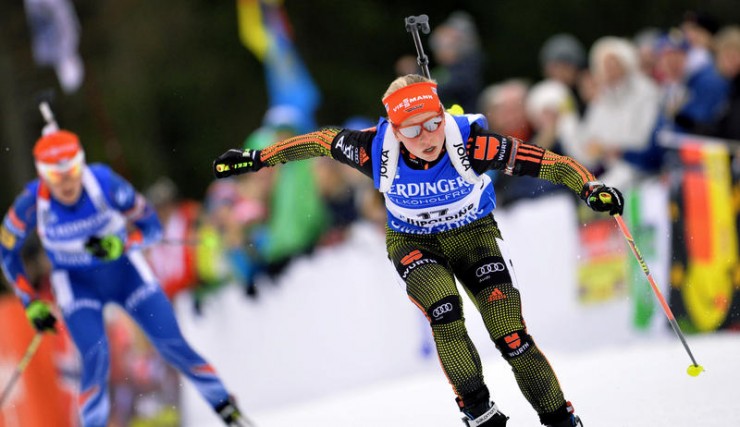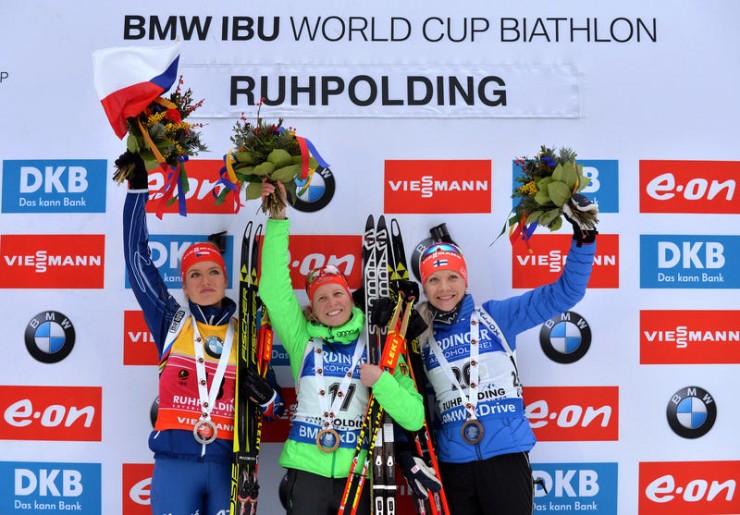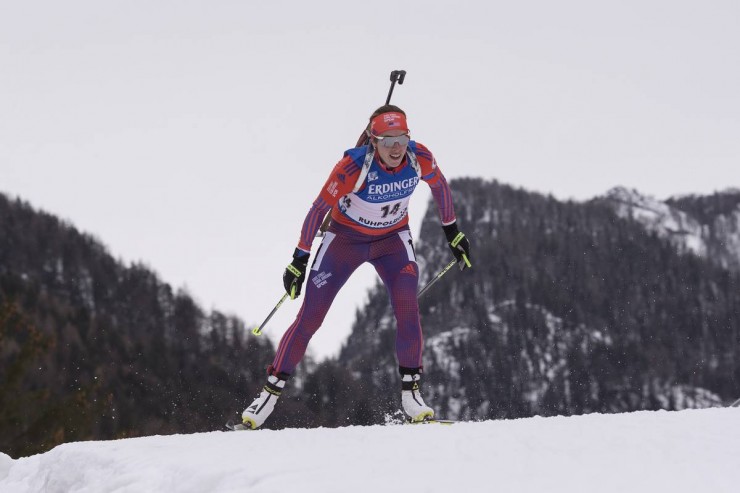
In a 7.5-kilometer sprint that came down to the wire on Friday afternoon, Germany’s Franziska Hildebrand, who has made Ruhpolding her training ground in recent years, achieved the second World Cup win of her season and career in front of thousands of excited fans, clamoring for a good result after the German men failed to reach the podium earlier that day.
Hildebrand crossed the finish line in 19:46.5 minutes, just 0.3 seconds ahead of Czech World Cup leader Gabriela Soukalová who had been the race leader until then. Finland’s Kaisa Mäkäräinen, who won the last race of the 2015 before the holiday break, could not make up a deficit on the final loop, taking third, just 2.3 seconds back. All podium finishers cleaned both shooting stages.
Susan Dunklee achieved the best results for a North American biathlete on Friday, finishing 11th, 45 seconds back from Hildebrand with one penalty (0+1).
Despite no direct sunshine on most of the track, snow conditions on the course started to get softer compared to the earlier men’s race where athletes had still described the track as “icy,” giving a slight advantage to starters with an earlier bib.
“Starting early was good today,” Hildebrand said in a post-race interview with German TV broadcaster ARD. “On that long climb back there, the snow was pretty deep because temperatures are above freezing point, you can see on the [TV] images that we kind of had to dig through that.”
Soukalová, starting in a red bib 13 as the overall World Cup leader, initially set the best split times on the course and at the finish by hitting all 10 of her targets. A slight mistake cost her several seconds, when she rushed to leave the mat on the range but dropped a ski pole, having to step back to pick it up.
Starting four positions behind her, Hildebrand skied fast while opting to shoot slow and methodical, only recording the 65th fastest time on the range (all podium finishers ranked in the bottom half of that statistic). After the second shooting, Hildebrand left the range 5.1 seconds behind the Czech, but was able to make up the deficit by skating the third-fastest last loop (and second-fastest course time overall). She received split times from her coaches, while Soukalová clocked the seventh-fastest final loop.

Hildebrand took time to waive to the crowd and kiss her skis in the finish: “We had really great skis today, and that was the foundation for the outstanding result,” she told ARD.
“I expected this today, it’s my home track so I’m very powerful,” Hildebrand added.
“It was a big surprise for me today,” she said in a post-race press conference. “It is difficult to compete in Germany with so many spectators, and so it’s unbelievable that I finished first. Over a couple of years, I think I can manage it better and better. I remember the first time when I competed in Oberhof [in front of a home crowd], it was a difficult feeling for me, because all the people screamed when they saw me.”
“I am very happy to have this result after Christmas, this is amazing for me,” Soukalová said during the press conference. “Sometimes you just don’t know what to expect, as other people might have better preparation than you.
“I was a little bit afraid of the range conditions, because I have seen the track after the guys’ race,” she added. “But I thought it was definitely quite well, and snow was not as deep as I thought. I just tried to do everything like in the training.”
One of the later starters to land on the podium, Finland’s Kaisa Mäkäräinen in bib 26, considered one of the best skiers in the field with frequently the best course times, could not quite make up a 12-second deficit to Hildebrand on the final loop, significantly reducing, but not closing the gap despite her coaches’ encouragement to catch the German.
“I was really really happy to shoot clean today. It has been many years since my last sprint zeroes,” Mäkäräinen said in the press conference. “Skiing in these conditions when it’s a little bit soft and no big uphills, it’s not my favorite, but I tried to do my best. I was quite behind the fastest skiers, so I still have work to do and am waiting for the more difficult track.”
Asked about the increasing level of competition, she added: “It looks like that. Many girls can now ski the fastest times, there are no big differences anymore. As you see, the women shoot always very well so if you want to be on the podium, you also need really good shooting. Some years ago I could shoot two penalties in the sprint still get high on the result list, but not anymore.”
Hildebrand recalled Mäkäräinen telling her in the locker room that she had not cleaned a sprint in a long time.
The top three all shot clean, but fourth-place finisher Laura Dahlmeier did not: widely missing her first shot of the competition to the audible dismay of many spectators. She could not know it then, but in the end, this mistake cost her a spot on the podium despite skiing the fastest course time by 17.7 seconds. She finished 2.8 seconds behind Hildebrand and just 0.5 seconds back from Mäkäräinen (a penalty lap typically costs racers about 20 seconds).
Dahlmeier achieved all that despite still suffering from the aftereffects of a cold, according to her interview with ARD.
“I am pretty surprised by that [course time], especially because it was so decisive,” Dahlmeier said. “I am extremely happy that it works so well so early again, but it’s all the more annoying that I shot the miss.
“I was not really nervous, but I just didn’t know where that shot went, and now I am irritated by that,” she recounted of her prone miss. “But well, that’s biathlon, that’s only human.”
“I think this [race] was an argument for how close the German team, and in general the international women’s biathlon field, is grouped together these days,” Dahlmeier added.
Also all shooting clean, Russia’s Olga Podchufarova finished fifth (+22.3), 0.2 seconds ahead of Italy’s Dorothea Wierer in sixth place (+22.5).
Shuffled Squads for North Americans; Dunklee Leads 4 in Pursuit

The U.S. and Canadian women’s teams came to Ruhpolding out of the holiday break with changed and smaller rosters.
US Biathlon assigned regular A-team member Hannah Dreissigacker to the second-level IBU Cup in Nove Mesto, Czech Republic, reinforcing a team with her sister Emily Dreissigacker, Maddie Phaneuf and Joanne Reid.
As with the men, the plan is to call up the best finisher for the next World Cups, in order to have the chance to collect Nation Cup Score points and secure at least the fourth starter spot for next season. Phaneuf is also pre-qualified for the upcoming Junior World Championships in Cheile Gradistei, Romania.
Thus only three U.S. athletes started the Ruhpolding sprint on Friday: Dunklee, Annelies Cook and Clare Egan.
“The break was good. I enjoyed spending a couple weeks at home in Craftsbury [Vermont],” Dunklee wrote in an email. “I stayed healthy and got in a super training block with the [Craftsbury Green Racing Project] biathletes and visitor Maddie Phaneuf.
“Normally the first races after the break aren’t my finest, but this week I have been adjusting to jet lag better than I ever have before and feel well rested and relaxed,” she continued. “I tried to approach the race without any expectations and just do my normal thing and see what happened.”
Dunklee added that she was glad to be racing in Ruhpolding two weeks in a row, after the originally scheduled IBU World Cup 4 in Oberhof, Germany, had to be moved to Ruhpolding for this week.
“Ruhpolding isn’t my favorite skiing course because everyone’s ski times tend to be very tight, but I love the general atmosphere and have great memories of this place,” she wrote.
In the 2011/12 season, Dunklee had achieved fifth in an individual-start race in Ruhpolding, her first major World Cup breakthrough.
On Friday, Dunklee started early in bib 14, one position behind eventual runner-up Soukalová. Dunklee went out of the gate fast, recording the ninth-fastest course time on the first loop. Nevertheless, she hit all five prone targets in what looked like a fluid sequence by her usual standards on the range (with the eighth-fastest shooting). After skiing a slower second loop, she went on to miss one of her standing targets (0+1).
“My prone shooting has been going well lately but standing has been challenging all winter,” Dunklee reflected. “Although it wasn’t perfect, I was satisfied to have a good standing stage today.”
Dunklee skied the 11th-fastest course time overall, but as she explained, an error on the last loop — out of the sights of TV cameras — might have cost her an even better position.
“On the last loop I planted my pole between my legs and fell which cost me a couple places but I’m hoping to make those up tomorrow!” she explained.
One position behind Dunklee was France’s Marie-Dorin Habert in 12th. Ranking second in the overall World Cup standings, Habert missed two (1+1) and finished 53.4 seconds back from Hildebrand.
Starting closer to the middle of the field in bib 41 when course conditions already had started to deteriorate, Cook also qualified for Saturday’s pursuit in 43rd place. Like Dunklee, she initially shot clean, before missing one shot in the standing stage (0+1), and finished 1:47 back.
Egan started even later in bib 79, and two misses in the standing shooting (0+2) cost her a better result after initially skiing in 49th after the first loop and prone stage. In the end she finished in 74th (+3:08.6), over 30 seconds out of the top 60 needed to qualify for the pursuit.
Like the U.S., Biathlon Canada also only had three women at the start of Friday’s sprint.
Rosanna Crawford, who stands as Canada’s best woman in the overall World Cup, caught a cold over the holiday break and decided to stay home in Canmore, Alberta, to rest and train.
Thus Zina Kocher and Sarah Beaudry were called up from the IBU Cup team, while first-trimester World Cup starter Emma Lunder was assigned to join a group heading to Nove Mesto.
Kocher notched fifth in an individual 15 k and sixth in a 7.5 k sprint race in Obertilliach, Austria, just before the holiday break. Beaudry had placed 12th in the sprint and 37th in the 15 k there.
In Ruhpolding, they joined Julia Ransom as the only woman who already competed in the World Cup weekend in Pokljuka, Slovenia. On Friday, 22-year-old Ransom achieved the best result for her team in 49th (+2:02.1). She initially cleaned prone, leaving the range in 25th, but missed two shots in standing (0+2), while skiing the 44th-fastest course time overall.
Beaudry finished 55th (+2:23.0) after missing one shot (0+1), narrowly qualifying for the pursuit 10 seconds ahead of 60th.
Kocher finished 76th (+3:10.7), after skiing four penalty laps (1+3). She ended up just behind Egan, also missing the pursuit.
Pursuit Race on Saturday
“Tomorrow will be another very close race,” Hildebrand predicted of the 10 k pursuit. “I am not actually getting chased, the four of us [Hildebrand, Soukalová, Mäkäräinen, Dahlmeier] are only 2.8 seconds apart going on the first loop, so it rather has a mass-start character. I hope we can benefit from each other and pull each other, because the others are also extraordinary skiers.”
“For tomorrow I think everything is wide open,” her teammate, Dahlmeier added. “I think the four of us will go on the first loop [together]. It will surely be a suspenseful race that will be decided on the shooting range again. I feel strong in terms of skiing, especially on the final loop. This will be an exciting race in front of a home crowd.”
Harald Zimmer
Harald has been following cross-country skiing and biathlon for some 20 years since the Olympic Winter Games in Albertville and Lillehammer. A graduate of Middlesex University London and Harvard University, he now lives near the Alps where he likes to go skiing, snowboarding and hiking. He is a former track athlete in middle-distance running, as well as a huge NBA fan.



